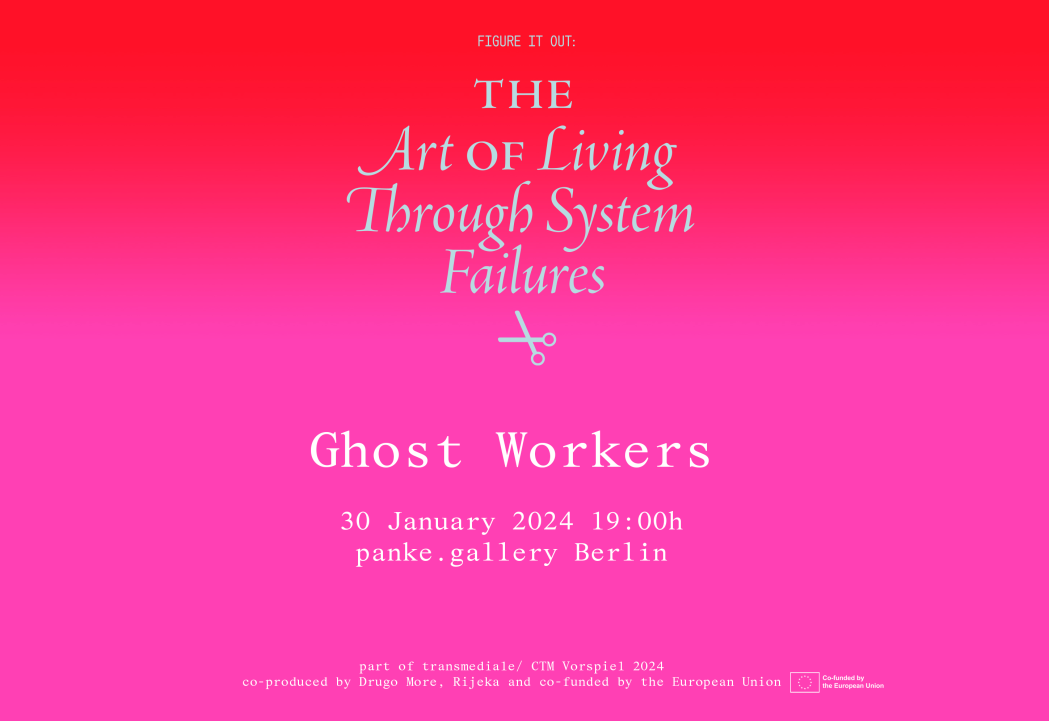Figure it out: Ghost Workers
Practicing resilience in remote work systems and on platforms
Talks by Aleksandra Lakić and Max Haiven Bonfire storytelling and food with Mara Ferreri, Valeria Graziano, Marcell Mars, Tomislav Medak & !Mediengruppe Bitnik

About the event
"Snađi se, druže!" – "figure it out, comrade" – is a common phrase used in former Yugoslavia. It originated during the WWII indicating that partisans in action had to come up with solutions under extremely unfavourable conditions. The question, when given instructions for an impossible mission, would often be "but how do I do that?", and the answer would often be "figure it out, comrade". Later during the socialist period, this expression would be used for practices that people were devising when encountering bureaucratic or material constraints in everyday life. All periods and societies have such practices of common lying, cheating and stealing and common phrases to name them.
FIO is a collective exploration of stories of ingenuity that people with little or no power devise when systems fail them. The evening at panke.gallery is focused on the inginuity of workers in the global gig factory. Particularly on tactics the workers on platforms such as Microwork, Amazon Turk or Upwork based in the Eastern Europe and the Global South contrive to fake their location or presence to cirumvent scant pay, surveillance and control that is frequently not expected from the gig workers in the Western Europe and the Global North.
The upcoming event features a talk by Aleksandra Lakić, introducing her and Saša Savanović's research on the socio-economic situation and labor conditions in platform economy in South Eastern Europe. The talk will also assess the impact of algorithmic management and surveillance as factors contributing to declining quality of work on digital labour platforms. A second presentation will be held by the researcher Max Haiven, who has recently collaborated with rank-and-file Amazon workers to write and publish short, speculative fiction stories about 'the world after Amazon.'
The bonfire is an invitation to participate in a collective reading of stories of such practices we have gathered and to contribute your own first-hand or second-hand stories and thoughts. We intend the reading to be convivial, spilling over into a shared meal.
Event produced by Drugo More in collaboration with !Mediengruppe Bitnik.
Part of transmediale & CTM Vorspiel 2024.
Talks by
Max Haiven is a writer and teacher and Canada Research Chair in the Radical Imagination. His most recent books are Palm Oil: The Grease of Empire (2022), Revenge Capitalism: The Ghosts of Empire, the Demons of Capital, and the Settling of Unpayable Debts (2020) and Art after Money, Money after Art: Creative Strategies Against Financialization (2018). Haiven is editor of VAGABONDS, a series of short, radical books from Pluto Press. He teaches at Lakehead University, where he directs the ReImagining Value Action Lab (RiVAL). His current book project is The Player and the Played: Financialization, Gamification and (anti-)Fascism.
Aleksandra Lakić is a researcher and author with a background in political science and sociology. Her research focuses on a trajectory of transformation of work and the welfare state, with the aim of designing alternative models of workplace organization based on the principles of economic democracy, autonomy and solidarity. She is the author of a number of articles, research studies and policy papers, including the recently published Workers without borders: The right of workers from the Balkans in the EU (Friedrich Ebert Stiftung 2021) and Governing together: Contributions to the research of self-management and its (dis)continuities (Crvena-IPE-Zajedničko,2022)
Supporters
Funded by the European Union. Views and opinions expressed are however those of the author(s) only and do not necessarily reflect those of the European Union or European Education and Culture Executive Agency. Neither the European Union nor the granting authority can be held responsible for them.